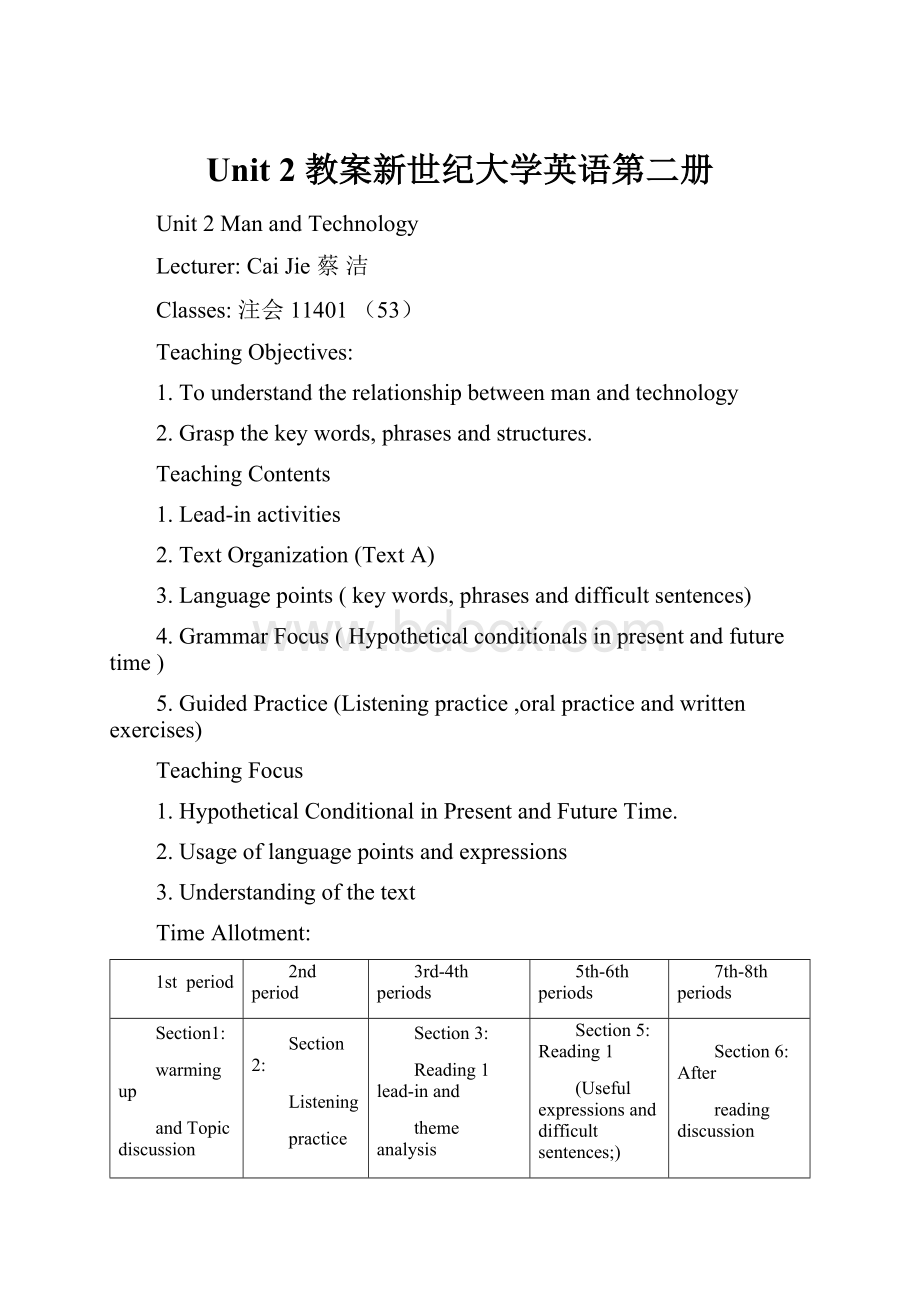Unit 2 教案新世纪大学英语第二册.docx
《Unit 2 教案新世纪大学英语第二册.docx》由会员分享,可在线阅读,更多相关《Unit 2 教案新世纪大学英语第二册.docx(20页珍藏版)》请在冰豆网上搜索。

Unit2教案新世纪大学英语第二册
Unit2ManandTechnology
Lecturer:
CaiJie蔡洁
Classes:
注会11401(53)
TeachingObjectives:
1.Tounderstandtherelationshipbetweenmanandtechnology
2.Graspthekeywords,phrasesandstructures.
TeachingContents
1.Lead-inactivities
2.TextOrganization(TextA)
3.Languagepoints(keywords,phrasesanddifficultsentences)
4.GrammarFocus(Hypotheticalconditionalsinpresentandfuturetime)
5.GuidedPractice(Listeningpractice,oralpracticeandwrittenexercises)
TeachingFocus
1.HypotheticalConditionalinPresentandFutureTime.
2.Usageoflanguagepointsandexpressions
3.Understandingofthetext
TimeAllotment:
1stperiod
2ndperiod
3rd-4thperiods
5th-6thperiods
7th-8thperiods
Section1:
warmingup
andTopicdiscussion
Section2:
Listening
practice
Section3:
Reading1lead-inand
themeanalysis
Section4:
Reading1(questionsandgroup-
discussion,structure;
Section5:
Reading1
(Usefulexpressionsanddifficultsentences;)
Section6:
After
readingdiscussion
Review&WordFormation&
Exercises
TeachingMethods:
●Explanation
●Groupdiscussion
●Questionsandanswers
●Multi-media
●Performance
TeachingProcedure:
1.Warm-upActivity
1)GroupDiscussion
1.Whatdoyouthinkisthekeytohappiness?
Doesithaveanythingtodowiththedevelopmentoftechnology?
2.Whatchangeshavetakenplaceinourlifewiththeadvancementoftechnology?
3.Doyouthinktechnologymakesyourlifeeasier?
Couldyougivesomeexamples?
4.Istheadvancementoftechnologyalwaysagoodthing?
2)Quotesaboutfriendship.
1.Happinessconsistsincontentment.
A:
知足常乐。
2.Happinessliesnotinthemerepossessionofmoney;itliesinthejoyofachievement,inthethrillofcreativeeffort.
—FranklinRoosevelt,Americanpresident
A:
幸福不在于拥有金钱,而在于获得成就时的喜悦以及产生创造力的激情。
——美国总统F.罗斯福
3.Thereisaneviltendencyunderlyingallourtechnology—thetendencytodowhatisreasonableevenwhenitisn'tanygood.
—RobertPirsig,Americanphilosopher
A:
我们的科技潜藏着一个不幸的倾向,那就是去做合理的事,即使它并无任何好处。
——美国哲学家R.普西格
2.TextOrganization
Partone:
(Para1-2)Materialandtechnologicaladvancesdonotreallybringhappinesstopeopleinthedevelopedcountries.ThoughAmericansnowarewealthierthantheywereinthemiddleofthelastcentury,theyarenothappierthantheyusedtobe.
PartTwo:
(Para3-5)Technologyandhappinessarenotnecessarilycloselycorrelatedbecausepeopleadapttotechnologicalprogresstooquickly.
PartThree:
(Para6-9)Thecurrentcommentsontechnologyhavemostlycenteredonthebadeffectsoftechnologyonhumanrelationshipsratherthanparticular,harmfultechnologies
PartFour:
(Para10)Themostimportantimpactoftechnologyonpeople’ssenseofwell-beingisinthefieldofhealthcare.
PartFive:
(Para11)Peopleingeneralclaimthatonadeeperlevel,technologycannotbringhappinesstothem,whichisjustcontradictorytothefactthatithasgreatlyimprovedpeople’shealthandlifeexpectancy.
3.LanguagePoints
A.WordsandExpressions
1)(L.3)gross:
a.general,total
e.g这个包裹连盒子总重量是十公斤。
(=Thegrossweightofthepackageis10kilos,includingthebox.)
2)(L.3)triple:
v.(causeto)growtothreetimestheamountornumber
e.g.新设备的引进使我们的产量增加到了三倍。
(=Theintroductionofnewequipmenthastripledtheoutput.)
3)(L.5)lifeexpectancy:
thelengthoftimethatapersonoranimalisexpectedtolive
e.g.这个部落人的平均寿命是40岁。
(=Theaveragelifeexpectancyofthepeopleinthistribeis40years.)
Collocations:
lowlifeexpectancy预期寿命短
highlifeexpectancy预期寿命长
alifeexpectancyof50years预期寿命50年
4)(L.5)soar:
vi.riserapidlyortoaveryhighlevel
e.gUnexpectedlythejetcrashedshortlyafteritsoaredintotheair.
5)(L.5)boom:
n.a(periodof)rapidgrowthorincrease
e.g我们必须要意识到90年代的经济繁荣已经结束了。
(=Wehavetorealizethattheeconomicboomin90sisovernow.)
6)(L.10)entertainment:
n.sth.,esp.apublicperformance,thatamuses
e.g适当的娱乐对于情感和心理的健康是必要的。
(=Appropriateentertainmentisnecessaryforemotionalandpsychologicalhealth.)
7)(L.16)formal:
a.suitableforofficialoccasions,seriouswriting,etc.
butnotforordinaryconversation
e.gWeshouldbeformalonbusinessoccasions,andnevercallanyonebytheirfirstname.我们在商务场合应该讲究礼仪,不要对别人直呼其名。
Collocations:
formalcurriculum正式课程
formaldress礼服
formaleffectiveness正式生效
formalstyle正式文体
8)(L.16)survey:
n.ageneralexaminationorstudy,esp.carriedoutbyaskingpeoplequestions
e.g最近的调查发现学生希望在课堂上有更多的时间练习口语。
(=Therecentsurveyfoundthatstudentswantedtospendmoretimepracticingspeakinginclass.)
cf.inquiry,investigation&survey
这些名词均有“调查”之意。
inquiry普通常用词,指正式调查,也指一般的打听或查询。
investigation一般指系统的调查,以了解希望发现或需要知道的事。
survey多指为写书面报告而进行的民意测验或调查。
(Directions:
)Fillintheblankswiththewordsabove.Changetheformwherenecessary.
1.A/An_____byairlineofficialshasshownthatthecrashwascausedbyhumanerror.(=investigation)
2.Outofcuriosity,shemade_____abouttheguywhodatedhersister.(=inquiries)
3.Thisreportwasbasedona/an_______ourgroupcarriedoutinthepasttwomonths.(=survey)
4.Someofthepeopleunder______havebeenaccusedofspying.(=investigation)
9)(L.19)onaverage:
inmostcases;usually
e.g我国成年人平均每天抽烟五根。
(=Adultsinourcountrysmokeonaveragefivecigeratteseveryday.)
10)(L.30)whenitcomesto:
whenitconcerns
e.g在记者招待会上,当提到这位影星的私人生活时,他总是保持沉默。
(=Atthepressconference,whenitcametohispersonallife,themoviestaralwayskeptsilence.)
11)(L.31)correlation:
n.astructural,functional,orqualitative
correspondencebetweentwothings
e.gThereisanobviouscorrelationbetweensunbathandskincancer.
12)(L.37)phenomenon:
n.anoccurrence,acircumstance,orafactthatisperceptiblebythesenses.
e.g对数学的透彻理解有助于解释各种各样的自然现象。
(=Athoroughunderstandingofmathematicshelpsexplainawiderangeofnaturalphenomena.)
13)(L.48)atwork:
havinganeffectonsth.
e.g经济学家们正在研究通货膨胀在经济中的作用。
(=Economistsarenowstudyingtheinflationaryforcesatworkintheeconomy.)
14)(L.50)frustrating:
a.annoying;discouraging
e.g.随着孩子们渐渐长大,他们开始反抗父母的管束。
(=Astheygrowolder,kidsbegintorebelagainsttherestraints
imposedbytheirparents.)
frustrate:
v.tocausefeelingsofdiscouragement
*Lackofprogressinrecoveryfrustrateshergreatly.康复没什么起色,这让她很灰心。
frustrated:
a.beinginastateofupsetordiscouragement
*Theworld-famousdirectoroncewasafrustratedactor.这位世界闻名的导演曾是个不得志的演员。
frustration:
n.thestateofbeingfrustrated
*Inchildren’seducation,it’snecessarytodeveloptheirabilitytoendurefrustration.在儿童教育中,培养他们的耐挫能力是有必要的。
15)(L.54)makenodifference:
notmatteratall
e.gThechildalwaysfeltneglectedbyhisfamily,andnomatterhowhardhetriedtodoeverything,itmadenodifference.
16)(L.58)cometomind:
make(one)suddenlythinkof
e.g.看到这幅图,你第一个会想到什么东西?
(=Atsightofthispicture,whatisthefirstthingthatcomestoyourmind?
)
17)(L.59)consciously:
ad.doingsth.withintention
e.gMostschoolteacherdon’tdiscriminatetheirstudentsconsciously.
18)(L.63)fragile:
a.easilybrokenordamaged
e.g建立在利益基础上的友谊是脆弱的。
(=Friendshipbasedoninterestisfragile.)
cf.weak,feeble,frail&fragile
这些形容词均有“虚弱的,乏力的”意思。
Weak普通用词,指缺乏应有的力量,可用于身体、意志或精神。
feeble指身体衰弱无力,精力几乎耗尽,含令人怜悯的意味。
Frail多指因经常生病而身体虚弱。
fragile可与frail换用,但语气强,强调脆弱,指人表示容易生病,指物表示容易破碎。
(Directions:
)Fillintheblankswiththewordsabove.Changetheformwherenecessary.
1.Hewasborna_______childandwastakencareofbyallthefamily.(=frail)
2.Thisisa_______andunconvincingargument.(=weak)
3.Keepthechildawayfromthe_______glassesonthetable.(=fragile)
4.Therescuershearda______cryoutofthewreckage.(=feeble)
19)(L.65)monitor:
vt.watchorlistento(sth.)carefullyoveracertainperiodoftimeforaspecialpurpose
e.g我们将会监督他的表现,看看他是否能有所进步。
(=Wewillmonitorhisperformancetoseeifhecanmakesomeprogress.)
cf.overhear,bug&monitor
这些动词均含“偷听,窃听”之意。
Overhear多指在别人不注意或不知道的情况下偶然听到谈话的内容。
Bug指在室内等处安装窃听器以窃听他人的谈话内容。
Monitor通常指用仪器设备偷听别人的谈话内容。
(Directions:
)Fillintheblankswiththewordsabove.Changetheformwherenecessary.
1.Becarefulwhatyousay;ourconversationmaybebeing_______.(=bugged)
2.I_______theirquarrellingwhenIpassedtheoffice.(=overheard)
3.Thedoctoris______thepatient’spulse.(=monitoring)
4.Ihaven’tbeeninformedofthis,just______it.(=overheard)
20)(L.66)disruptvt.bringorthrowintodisorder
e.g转校,尤其是在11岁至16岁之间,很容易打断一个孩子的教育。
(=Movingtoanewschoolcaneasilydisruptachild’seducation,especiallybetweentheagesofelevenandsixteen.)
Collocations:
disrupttraffic引起交通混乱
disruptschedule扰乱计划
disruptpublicorder扰乱治安
21)(L.67)fracture:
v.(causeto)breakorcrack
E,g他被提名破坏了权利的微妙平衡。
(=Thenominationofhimfracturedthedelicatebalanceofpower.)
cf.burst,crack,fracture&smash
这些动词均含“打破、弄碎”之意。
burst指某物因内部或外部压力过大而出现严重破裂、爆开或胀破。
例如:
*Itseemedthathisheartwouldburstwithhappiness.看上去他心中的快乐快要爆发出来。
crack多指因长期使用或经受压力,物体表现呈现裂纹、裂口或破裂、裂开,但一般没成碎片。
例如:
*Seeingtheicecrack,hequittheideaofskatingonit.看到冰裂开了,他打消了溜冰的念头。
fracture比crack的破裂程度更深更严重,常指断裂,医学上指骨折。
例如:
*HewasX-rayedandwasfoundedthathehadfracturedhisskull.他照了X光,发现头骨破裂。
smash指突然而猛烈地重击某物,使之破碎或完全变形。
例如:
*Thecarsmashedintothewall,andwasallruined,butluckilythedriversurvived.汽车撞上了一堵墙,完全毁了,幸好驾驶员活了下来。
22)(L.67)prominence:
n.thequalityorconditionofbeingprominent.
e.gSomeyoungwritersbornin80shaverecentlycometoprominence.一些生于80年代的青年作家们近来已经崭露头角。
23)(L.69)gradual:
a.happeningordevelopingslowlyandbydegrees;notsudden
e.g逐步的恢复对病人和医生来说都是鼓舞